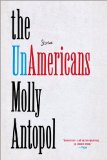Summary | Excerpt | Reading Guide | Reviews | Beyond the Book | Readalikes | Genres & Themes | Author Bio

Stories
by Molly Antopol
We stayed up so late that gauzy yellow light filtered in through the blinds and I could hear the garbage trucks outside, making their runs. Sveta was curvy and round, with a scatter of moles across her hips. And here I was, sixty-three, paunchy and balding, wondering how I had gotten a woman like Sveta into my bed, wondering even more how to make certain she stayed, and still completely clueless about how to keep things casual. "How long," I said finally, "has your husband been gone?"
"Eleven month."
"And am I too nosy if I ask how he went?"
"No, not nosy," she said, propping a pillow behind her head. And then she told me their story. She'd met him fifteen years ago, in her late twenties, just as they were finishing graduate school. They'd both been deep into their research—Sveta's dissertation was on Kiev's Golden Age, and Nikolai, a chemistry Ph.D., was researching Chernobyl's long-term impact on the nearby city of Pripyat—and there was something so comforting, Sveta told me, about those early years together. "It was the first time," she said, "I really knew what happiness means." Whenever they were together, even just reading side by side or walking down the block for groceries, the sky seemed a little brighter, the sun a little warmer, the world turned up a notch. They were both obsessed with their work, introverts at heart, and it had felt, once they were married, that she no longer had to try with other people, that what everyone else thought of her was of little importance. Of course they still went out with friends, but there was always a moment toward the end of the evening when they'd share a look across the bar, a silent understanding it was time to leave, to be alone again. That was a look I knew well, one Gail and I would notice between other couples, at dinners or parties, a look that always made us feel defensive and exposed. After those evenings, we'd find ourselves dissecting the relationships of our friends, picking apart their dynamic until we felt better about our own, standing beside one another at our twin sinks, brushing our teeth.
Nikolai had been exposed to Chernobyl's radiation every day for six years while he researched the disaster, Sveta continued, but it wasn't until he accepted a fellowship here and they moved to a safe, quiet street on Staten Island that he walked outside to rake the leaves one morning, clutched his chest and collapsed right there in the driveway. "Nobody had idea about his heart," Sveta said. "We were knowing nothing. Murmur condition is affecting something like one in every million men, and it has to be my Nikolai." Sveta was left alone in a new house in a new country with only Galina, a cousin she'd grown up with in Kiev who now lived in Chicago, to talk to.
I ran a finger along the inside of her wrist, creamy and warm and marbled with delicate veins. My own problems, the ones I had wallowed in for months, were nothing compared to hers. It occurred to me that she was stronger than I was. "Why not go home to your family?"
"I have no child, and my parents die long time ago. My grandmother raise me, but when Nikolai and I marry, she do aliyah to Israel. Move back home?" She shook her head. "At least here I can learn English and get job in accounting. It's more easy being in U.S."
"Oh, Sveta." A throwaway comment, but the only thing I could think to say.
"How you say here? Shit it happens." She laughed, but it sounded startled and strained—the laugh that carries over everyone else's in a crowded restaurant.
I, in turn, tried my best to hint at what an unbelievable catch I was. I told Sveta about growing up next door to Gail in Brooklyn, how she went from being my playmate at school to my best friend to my steady girlfriend. I told her we married at twenty-three and scrimped for years, finally landing our dream apartment on Riverside Drive. I told her Beth's birth was undoubtedly the most important day of my life. I told her how even as a little girl, Beth seemed more like a friend than a daughter. And I told her what a terrific time we had over the summer, after Beth finished law school and moved home to save money while she studied for the bar. What bliss: we ordered in most nights, matineed on Sundays, sat up late talking in the kitchen—it was as if she had never been gone.
Excerpted from The Unamericans: Stories by Molly Antopol. Copyright © 2014 by Molly Antopol. With permission of the publisher, W. W. Norton & Company, Inc.
Your guide toexceptional books
BookBrowse seeks out and recommends the best in contemporary fiction and nonfiction—books that not only engage and entertain but also deepen our understanding of ourselves and the world around us.